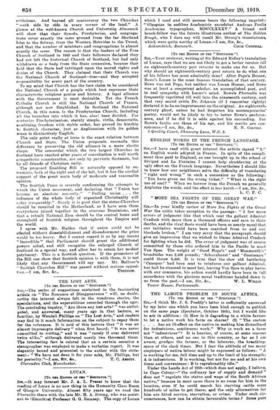(To THE EDITOR OF THE " SPECTATOR.") Ste,—Your reviewer, writing
of Sir Edward Ridley's translation of Lucan, says that we are not likely to get a better version till an eighteenth-century poet returns to make one for us. But why should an eighteenth-century poet return to do what one of his fellows has most admirably done? After Pope's Homer, Rowe's Lucan is the most famous translation of that century. Rowe was not Pope, but neither was Lucan Homer, and Rowe was at least a competent scholar, an accomplished poet, and in real sympathy with Lucan's mind. Rowe's Pharsalia was frequently reprinted till well into the nineteenth century, and that very sound critic Dr. Johnson (if I remember rightly) declared it to be an improvement on the original. An eighteenth- century ghost, unless he had forgotten his contemporaries' poetry, would not be likely to try to better Rowe's perform- ance, and if he did it is odds against his succeeding. For Rowe's faults are those of his age, and his merits are con.






































 Previous page
Previous page